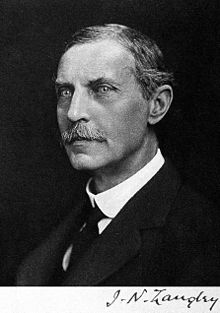John Newport Langley
| John Newport Langley | |
|---|---|
 |
|
| Born |
2 November 1852 Newbury, UK |
| Died | 5 November 1925 (aged 73) Cambridge, UK |
| Residence | UK |
| Nationality | British |
| Fields | Physiologist |
| Institutions | University of Cambridge |
| Alma mater | University of Cambridge |
| Academic advisors | Michael Foster |
| Notable students |
Walter Morley Fletcher Charles Sherrington |
| Known for |
Autonomic nervous system Secretion |
| Notable awards | Royal Medal (1892) |
| Notes | |
Prof John Newport Langley FRSE LLD (2 November 1852 – 5 November 1925) was a British physiologist.
He was born in Newbury, Berkshire the son of John Langley, the local schoolmaster, and his wife, Mary Groom. He was educated at Exeter Grammar School in Devon. In 1871 he won a place at St John's College in Cambridge University where he graduated MA before continuing multiple postgraduate studies, gaining several doctorates.
He spent his entire career at Cambridge University, beginning as a Demonstrator in lectures in 1875. He began lecturing in Physiology in 1884 and was awarded a professorship in 1903, succeeding Prof Michael Foster.
He was elected a Fellow of the Royal Society in 1883 and later its vice-president. He was made an Honorary Fellow of the Royal Society of Edinburgh in 1916.
Langley is known as one of the fathers of the chemical receptor theory, and as the origin of the concept of "receptive substance".
In 1901, he advanced research in neurotransmitters and chemical receptors, working with extracts from adrenal glands. These extracts elicited responses in tissues that were similar to those induced by nerve stimulation.
He died in Cambridge on 5 November 1925.
A brass plaque to Langley's memory exists in Trinty College Chapel at Cambridge University.
In 1902 he married Vera Kathleen Forsythe-Grant (d.1932).
...
Wikipedia
